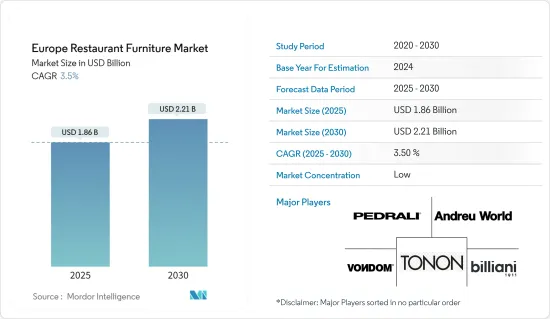PUBLISHER: Mordor Intelligence | PRODUCT CODE: 1636097

PUBLISHER: Mordor Intelligence | PRODUCT CODE: 1636097
Europe Restaurant Furniture - Market Share Analysis, Industry Trends & Statistics, Growth Forecasts (2025 - 2030)
The Europe Restaurant Furniture Market size is estimated at USD 1.86 billion in 2025, and is expected to reach USD 2.21 billion by 2030, at a CAGR of 3.5% during the forecast period (2025-2030).

The restaurant furniture market in Europe is a thriving and expanding sector. Numerous factors drive this market, such as the expanding food service sector, tourism, discretionary income, outdoor eating trends, and growing concerns about sustainability and eco-friendliness. Using eco-friendly designs and sustainable materials is one of the newest trends in the industry.
The demand for environmentally friendly furniture constructed of sustainable materials has increased in Europe due to consumers' growing concerns about sustainability and eco-friendliness. In terms of trends, there is an increasing demand for versatile and flexible furniture that can adapt to different dining setups. This includes modular seating arrangements, adjustable tables, and space-saving designs for various group sizes and layouts. Additionally, technology integration is becoming more prevalent in restaurant furniture. You might come across tables with built-in charging ports or wireless charging capabilities, enhancing the dining experience for tech-savvy customers.
Europe Restaurant Furniture Market Trends
Expansion of the Hospitality Industry is Driving the Market
Changing consumer preferences are also driving the expansion of the hospitality industry in Europe. Consumers are increasingly seeking unique and memorable dining experiences, leading to a higher demand for custom-designed and visually appealing furniture in restaurants. This trend is part of the broader growth of the hospitality industry in Europe, which is fueled by several key factors.
Europe's popularity as a tourist destination plays a significant role in driving the hospitality market, attracting millions of visitors annually. This influx of tourists has increased the demand for various hospitality services, including accommodation, dining, and entertainment, contributing to market growth.
Moreover, Europe's overall economic development has resulted in higher disposable incomes and increased leisure spending among consumers. This economic growth has further fueled the expansion of the hospitality industry in the region. Additionally, the digitalization of the hospitality industry has had a profound impact. Online booking platforms, digital marketing strategies, and personalized services have enhanced customer engagement and convenience, thereby driving the overall expansion of the hospitality market in Europe.
Germany is the Major Furniture Country in Europe
Germany is one of the major furniture-producing countries in Europe. The country has a strong tradition of furniture manufacturing and is known for producing high-quality, innovative furniture. Germany's furniture industry is characterized by a mix of traditional craftsmanship and modern design, with a focus on quality and durability. The country's furniture market is also influenced by its strong economy and high standards of living, which drive demand for both residential and commercial furniture.
Germany, a major player in the European furniture market, heavily relies on imports to cater to its diverse furniture needs. The country, known for its discerning taste, sources furniture from global suppliers. This demand is not limited to residential spaces but extends to commercial establishments, including the vibrant restaurant scene. German eateries prioritize both form and function, favoring furniture that not only showcases contemporary aesthetics but also prioritizes comfort. Ergonomic designs take center stage, aiming to enhance the dining experience for patrons.
Europe Restaurant Furniture Industry Overview
The market is highly competitive, with many regional manufacturers and suppliers operating. Manufacturers and suppliers are focusing on innovative designs, eco-friendly material usage, and customization options to attract customers. Europe Restaurant Furniture Market is fragmented, with various small and local players and a large number of small companies present in the market.
Additional Benefits:
- The market estimate (ME) sheet in Excel format
- 3 months of analyst support
TABLE OF CONTENTS
1 INTRODUCTION
- 1.1 Study Assumptions and Market Definition
- 1.2 Scope of the Study
2 RESEARCH METHODOLOGY
3 EXECUTIVE SUMMARY
4 MARKET DYNAMICS AND INSIGHTS
- 4.1 Market Overview
- 4.2 Market Drivers
- 4.3 Market Restraints
- 4.4 Industry Value Chain Analysis
- 4.5 Industry Attractiveness - Porter's Five Forces Analysis
- 4.5.1 Bargaining Power of Suppliers
- 4.5.2 Bargaining Power of Buyers
- 4.5.3 Threat of New Entrants
- 4.5.4 Threat of Substitutes
- 4.5.5 Intensity of Competitive Rivalry
- 4.6 Insights of Technology Innovations in the Market
- 4.7 Impact of COVID-19 on the Market
5 MARKET SEGMENTATION
- 5.1 By Type
- 5.1.1 Dining Sets
- 5.1.2 Seating Furniture
- 5.2 By Application
- 5.2.1 Restaurants
- 5.2.2 Snack Bar
- 5.2.3 Hotels and Bars
- 5.2.4 Others
- 5.3 By Country
- 5.3.1 Germany
- 5.3.2 United Kingdom
- 5.3.3 France
- 5.3.4 Italy
- 5.3.5 Rest of the Europe
6 COMPETITIVE LANDSCAPE
- 6.1 Market Concentration Overview
- 6.2 Company Profiles
- 6.2.1 Pedrali
- 6.2.2 Tonon
- 6.2.3 Andreu World
- 6.2.4 Vondom
- 6.2.5 Billiani
- 6.2.6 Kristalia
- 6.2.7 Fiam
- 6.2.8 Nardi
- 6.2.9 Satelliet
- 6.2.10 Arper*
7 MARKET OPPORTUNITIES AND FUTURE TRENDS
8 DISCLAIMER AND ABOUT US




